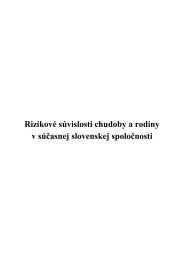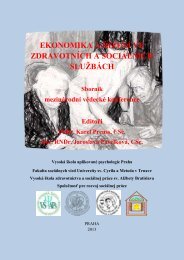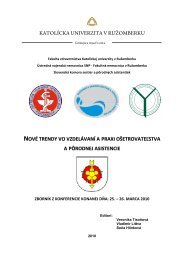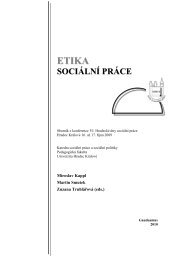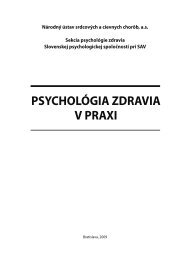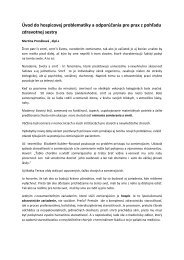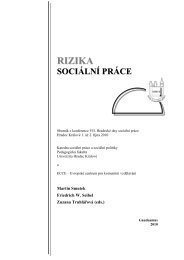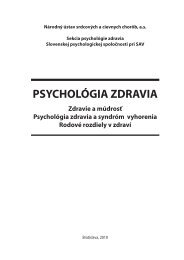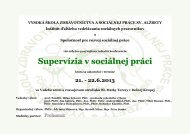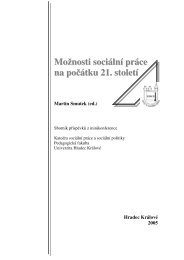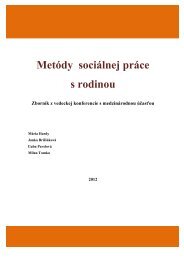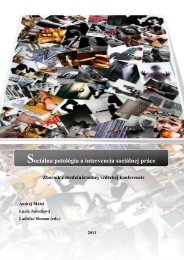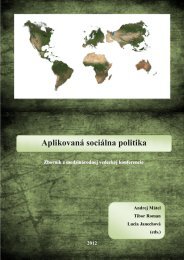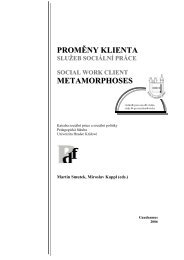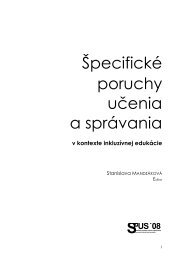Zmena klÃmy â možný dopad (nielen) na obyvateľstvo - Prohuman
Zmena klÃmy â možný dopad (nielen) na obyvateľstvo - Prohuman
Zmena klÃmy â možný dopad (nielen) na obyvateľstvo - Prohuman
You also want an ePaper? Increase the reach of your titles
YUMPU automatically turns print PDFs into web optimized ePapers that Google loves.
On another level, the research highlights the importance of providing<br />
open-ended challenges for children. As against labelling one situation as fair and<br />
another as unfair, the research supports the educatio<strong>na</strong>l value in children being<br />
encouraged to work through justice-related sce<strong>na</strong>rios where the resolutions are<br />
multiple. The programme developed from and tested in the research suggests using<br />
drama and introducing sce<strong>na</strong>rios which e<strong>na</strong>ble the children to explore different<br />
responses and outcomes. Sce<strong>na</strong>rios suggested included those likely to be familiar<br />
to the children and those reflecting global concerns, for example: unequal<br />
buying power disrupting local markets, migration and food inseccurity. Asking<br />
children to evaluate and respond to these situations e<strong>na</strong>cts the Freirean dy<strong>na</strong>mic<br />
of reflection and action (Freire, 1994; McCloskey, 2011). It locates children as<br />
agents in their own learning and as citizens rather than recipients of knowledge<br />
or citizens-in-the-making. The learning experience becomes transformative and<br />
empowering as children arrive at behaviours they consider fair rather than just<br />
evaluating others’ behaviour. The pedagogy can be considered “critical” (Andreotti,<br />
2006) in that it provides spaces to a<strong>na</strong>lyse and experiment without telling<br />
learners what to think.<br />
Scaffolding an Understanding of Global Poverty<br />
The attitudes of the participant educators towards teaching children about global<br />
poverty was reflective of the wider debate about children’s perceived readiness<br />
to deal with social justice issues (Robinson and Jones Diaz, 2009 and Kelly and<br />
Brooks, 2009). As is discussed above, several of the participant educators “didn’t<br />
want to upset” the children or, in regard to the draft programme, take away from<br />
the colourful and happy portrayal of Kenyan life presented. Their concern, that<br />
poverty related issues are i<strong>na</strong>ppropriate for young children, reflects the discourse<br />
of vulnerability and innocence, characteristic of a modernist perspective of childhood<br />
(Kelly and Brooks, 2009; Robinson and Jones Diaz, 2009). Other participant<br />
educators however introduced poverty into their teaching on their own initiative.<br />
Where educators did so there was some evidence to suggest that the approach<br />
tended to govern children’s perceptions of Kenya and served to reinforce stereotypical<br />
essentialist views of African poverty.<br />
While the inclusion of global poverty in early childhood education may prove<br />
controversial and problematic, it can also be seen as integral to building an understanding<br />
of the wider world, global justice and global citizenship. Furthermore,<br />
as the first phase of the research indicates, young children are already developing<br />
perceptions of global poverty from the media and fundraising campaigns.<br />
This supports the inclusion of learning about global poverty in early childhood<br />
180



